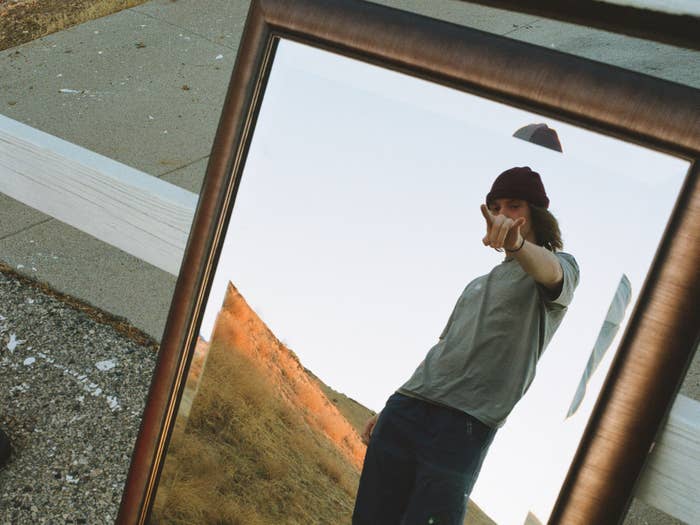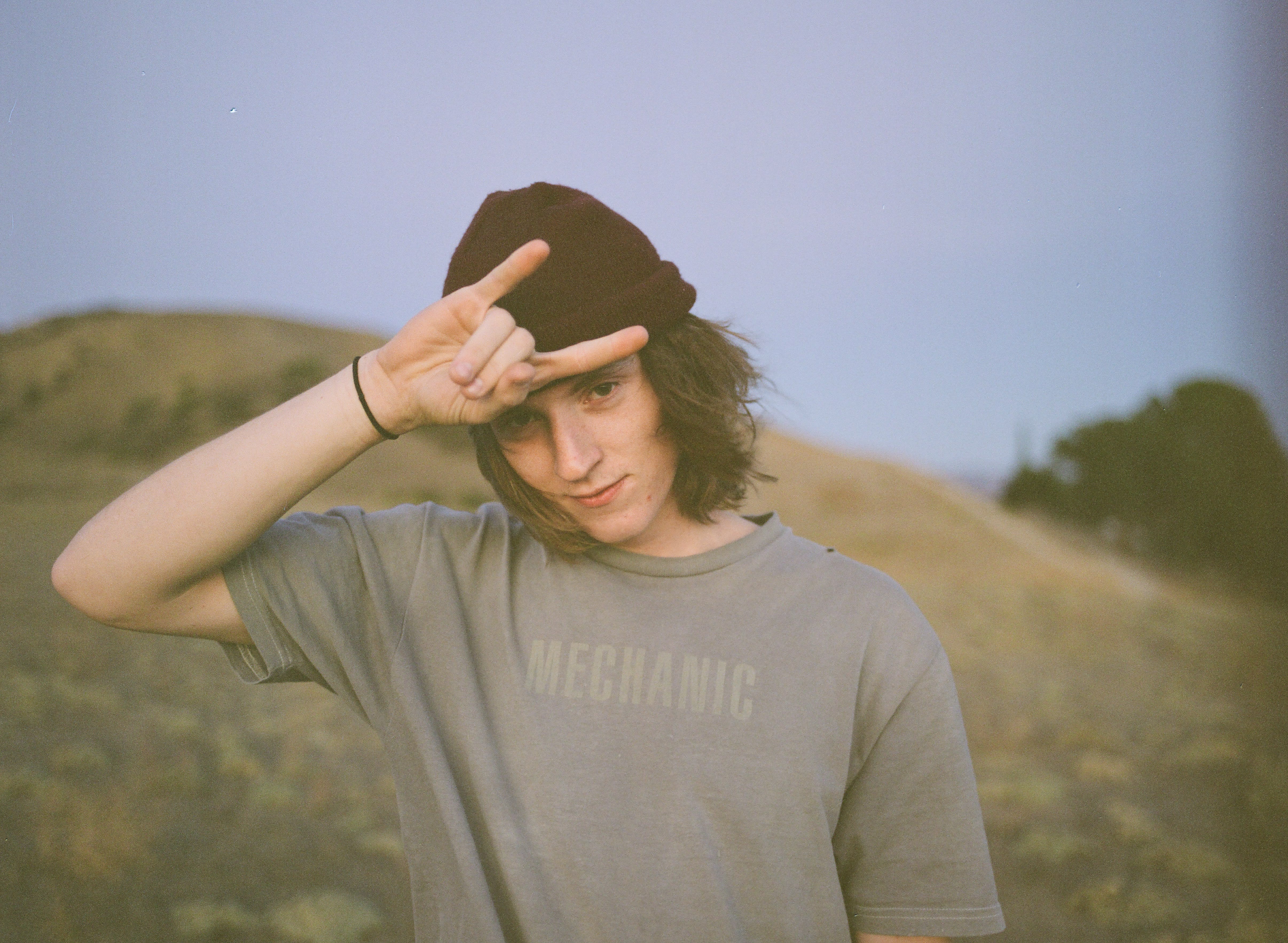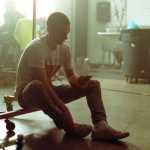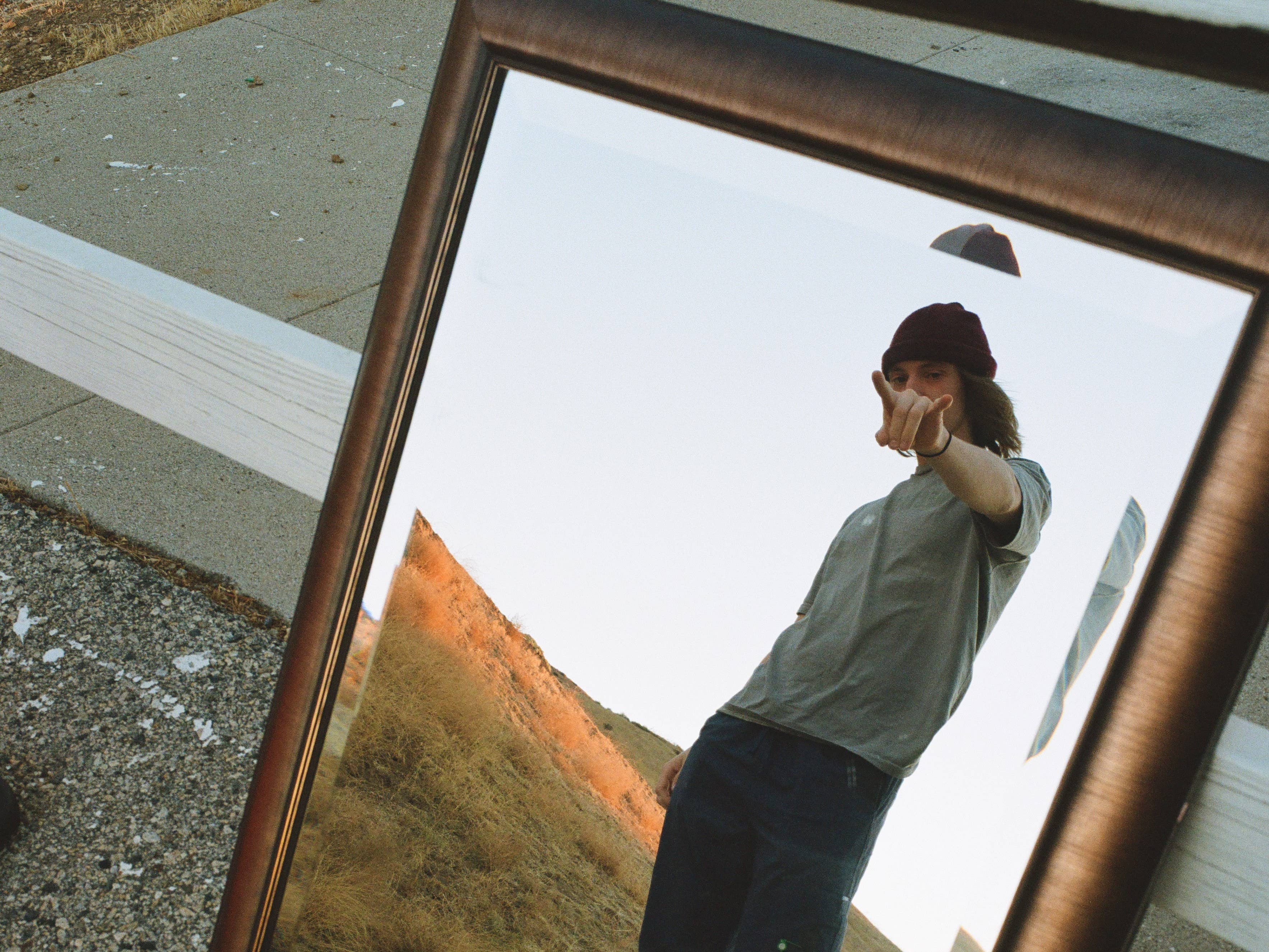
For many Americans, last month’s midterm elections represented a culmination of stress and anxiety. Even Frank Ocean made a rare appearance, temporarily easing tension with a three-part special edition of his Blonded radio show. First up was his fitting Endless cut “U.N.I.T.Y.” The second song was “You,” a wobbly, synthy hug of a song released earlier in 2018 by Mk.gee. It caught the independent college student completely off-guard.
“I had absolutely no idea,” Mk.gee says over the phone. “I didn’t even know he was airing another Blonded episode that day. I was surprised to say the least. [Frank Ocean] has done so much for music, simply put. He inspires me a lot, the way he conceptually looks at music.”
The cosign came just 10 days before the arrival of Mk.gee’s latest release, Fool. It’s heavier, headier work than his debut Pronounced McGee, one that came about during a year of seismic change. “I was pretty low when I was making all this music,” he says. “But the songs aren’t necessarily sad.”
When Mike Gordon left New Jersey for college in California, his guitar came too. He had gravitated towards the instrument in the midst of a childhood that included compulsory piano lessons. The guitar—electric guitar, specifically—was different. Gordon gravitated towards Jimi Hendrix and other virtuosos who “don’t play…how the instrument’s supposed to be played.”
By the time Gordon arrived at USC’s Thorton School of Music, his guitar had become an integral part of his life. But singing and recording were far from his mind. Gordon wanted to be a professional guitarist, a gun for hire. So he went to class and eventually joined a band. His bandmates were fellow music students, but Gordon found his creativity constrained. He started to wonder if he could do it himself. “It wasn’t coming from a selfish place,” he says. “It was just me trying to satisfy these visions that I had for songs.”
While recording alone, he discovered he “[had] so much leeway to make weird noises… The way I attack singing can be weird,” he says, “but no one can tell me, ‘You’re doing that wrong.’”
Three years later, the artist known as Mk.gee is getting ready to leave school. He’ll do so with momentum—May’s Pronounced McGee was one of the year’s standout indie albums, and last Friday, November 16, Mk.gee released a new EP, Fool.
With it came the Frank Ocean cosign. And for good reason—Fool finds Mk.gee in deeper water, grappling with solitude, blunt change, and fast-approaching adulthood. The guitar is still by his side, but the circumstances have changed. For one, Gordon has found a way around a lifelong hatred of acoustic guitar. He’s also discovering how to be alone. Fool marked the end of a serious relationship, and while there’s a familiar bounce and pep to Mk.gee’s music, the lyrics often tell a different story.
Still, the resulting solitude has created some blissful sounds. And to hear Mk.gee tell it, going it alone might be the best way to go.
How did you first get into music?
I started taking piano lessons when I was 6 with this really amazing classical Russian teacher. I had a hard time understanding her but she gave me a great understanding of what a song should be. More importantly she gave me room to bring my own pieces in, which I did a lot. That is really rare for classical-based piano teachers. It wasn’t classical at all, they were just pop tunes I was writing at 7 or 8, banging on the piano. Really simple 1-4-5 stuff.
But that was important from a creative standpoint, just having that basis of writing. And so I switched to guitar around 11, because everyone does that [Laughs].
Who were some of the artists that inspired you to pick up the guitar?
Eric Clapton, Jimi… more artists on the side of people who have shifted musical trends. People that take these instruments and don’t play them how the instruments supposed to be played. I was really drawn to that but I didn’t know why at the time, I just knew I really liked it. Especially with Jimi’s playing, which really changed the game. He didn’t play like any conventional guitarists from the ‘60s and ‘70s. Deep Purple and all that classic rock stuff, too.
Were you playing in bands at this point?
I had this trio I used to play with. All great musicians, but not that great of people. I had a bunch of ideas, but they weren’t creatively accepting. That’s when I was thinking, “Damn, is there any way I can do this myself?” That’s how I got into recording. It wasn’t like, “Oh I want to have all of this control.” It wasn’t coming from a selfish place, it was just me trying to satisfy these visions that I had for songs.
Freshman or sophomore year of high school I started recording my own demos, playing all the instruments and having the freedom for creative output that I couldn’t have with the group. There’s literally no boundaries when you’re by yourself, which is daunting. But at the same time I learn a lot about myself with each project. It’s a growing period each time.
What did that look like while you were recording Fool? What felt fresh and different?
So much. When I started recording this, a lot of the things in my life started to change. I’m closing out in college, I’m starting to become way more independent as a human and adult, and I just got out of a relationship at the end of this last project. It was navigating this solitude, which I haven’t had to this extent in a while. So with the project, I don’t think I knew it in the moment but I was trying to soundtrack this change in my life, and this abrupt, extreme independence.
I don’t think I knew it in the moment, but I was trying to soundtrack this abrupt change in my life, and this abrupt, extreme independence.
One thing that stood out to me was your use of recollection—there are a lot of memories on these songs. It feels like you’re taking stock of everything that’s happened thus far, but it’s still a really fun listen.
Yeah, it was a tough period. I was pretty low when I was making all this music. But the songs aren’t necessarily sad. I had a bunch of new gear over the summer that I worked with in L.A. I explored with a lot of new stuff, one being acoustic guitar, which I used to absolutely hate. I hated the way people would record it, I hated the things that were tied to it, that douche culture that’s tied to acoustic guitar… but I learned to love it, and for this album I took the acoustic guitar and tried to make it sound not like an acoustic guitar.
There’s a collection of songs by this artist Taj Mahal who I was really into in high school. I revisited a lot of his stuff and on this live album he does a piece with a kalimba and there’s something really magical about it. I tried to replicate that kind of sound on the album. One artist that does a bit of that, on Perfume Genius’ new album, is Blake Mills. Especially with “new years” I tried to make that guitar really crunchy and kalimba-y.
What advice would you give to someone just discovering music and making their own demos, from a DIY perspective?
The biggest thing is, you don’t have to create with the intent of showing anyone anything. You don’t have to create thinking that you need a product at the end of this process. I don’t put the pressure on myself, ”Oh, this better become a song.” I’m kind of just in the playpen, and if an idea happens it happens.

The biggest thing is, you don’t have to create with the intent of showing anyone anything.
You gave a quote about the importance of silence on this release. Can you talk about that a little?
I think the last album was kind of the opposite, in terms of my attack towards writing. Fool feels a bit more deliberate in terms of the listener listening to it in a safe space, isolated. I want them to live in the silence, these pockets of silence on the album. I really tried to stress the push and pull.
Do you think the breakup has made you a better songwriter?
Yeah. I think lyrically, people write the best stuff when they’re uncomfortable, and in states of change. It’s just natural, it’s a natural human thing. You go through self-realizations, and you’re able to see things as they are without this wall in front of you. I don’t think the whole album has to do with the breakup, but that change is one of the main topics.
Did you ever have aspirations to be a studio musician, and explore music in that way?
That was why I first came to L.A. I had no intention of getting really into production and singing on my stuff, and playing it live. I grew up as a guitarist, so sometimes I get this smack in the face like, “Holy shit, I’m singing.” I never thought I’d be singing on all this shit five years ago.
Do you like doing it at this point? Are there moments where you’d rather just be on guitar?
Singing’s the best. It just makes you feel good. I’ve been singing for a while, but I’ve always been kind of self-conscious about my voice. Sometimes I have a show and I’ll think, “I’m a fuckin’ phony, I’m not a singer. People are going to see me sing? That’s insane.”
In some ways that self-consciousness can provoke you to do more interesting things with your voice. There are so many weird and different things you can do with delivery, you can really get away from any parts you don’t like.
Exactly, and that’s one of the things I love about it. Because I’m not a singer, I have so much leeway to make weird fucking noises. The way I attack singing can be weird, but no one can tell me, “You’re doing that wrong.”

